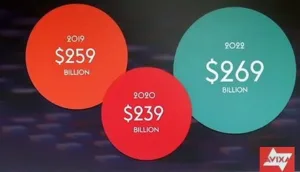As anyone who follows the Professional Audio-Video (Pro-AV) business already knows, InfoComm 2020, originally scheduled to be a real event in Las Vegas, was transformed into a virtual event, InfoComm Connected 2020. This is not surprising since Covid-19 has converted most scheduled live trade shows into virtual events this spring, summer and fall.

“Virtual” is a special problem for Avixa, the Audiovisual and Integrated Experience Association. This is the industry association that represents the Pro-AV industry worldwide, host of InfoComm and other Pro-AV trade shows in Europe (ISE) and Asia. The reason it is a special problem for Avixa compared, for example to SID, is that the Avixa member companies are the companies that provide the Pro-AV services to all trade shows and other live events.
Go to a trade show, any trade show in any field, and see a presentation on a big screen with good sound and you are likely to be looking at a LED screen or projector/screen combination supplied by an Avixa member and you are probably listening to sound from another Avixa member. Booth lighting on the show floor? Another member. Product introduction at a press conference in New York? The setup was probably by an Avixa member. The Trump Rally in Tulsa? More equipment from Avixa members, whether it was rented for the occasion or permanently installed in the stadium.
Covid-19 has hit Avixa members harder than other industries. Sean Wargo, Senior Director, Market Intelligence, Avixa, gave the Wednesday keynote speech at InfoComm Connected 2020 and shared his views of the affect of Covid-19 on Pro-AV worldwide.
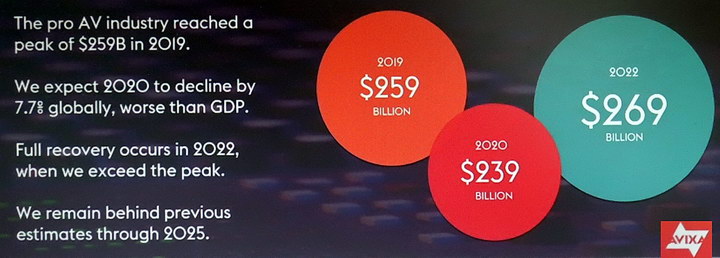 Pro-AV’s Bottom Line, According to Sean Wargo. (Credit: Avixa)
Pro-AV’s Bottom Line, According to Sean Wargo. (Credit: Avixa)
The net result is that while prior to Covid-19, Pro-AV was expected to grow in 2020 but it has not and will not through the end of the year. In fact, according to Wargo, it has declined by more that the GDP has declined, showing how the industry was particularly hard hit. Still, a $239 Billion industry total sales for 2020 is respectable. How can this be done, even though virtually all live events have been cancelled from March through the fall and probably most scheduled through the end of the year will be cancelled? The answer is that Pro-AV is a lot more than live events, although that is, perhaps, the most visible face of the industry.
Besides live events, Pro-AV has an impact on virtually every other industry. For example, Education is a major consumer of Pro-AV equipment and education has been seriously disturbed. This disturbance is not necessarily a bad thing for Pro-AV because some schools have decided, with no students in the school, to update their AV systems. Schools are also teaching on-line, using cameras, lighting systems and other Pro-AV paraphernalia. In addition, some schools are providing students with computers or other systems so they can attend on-line classes.
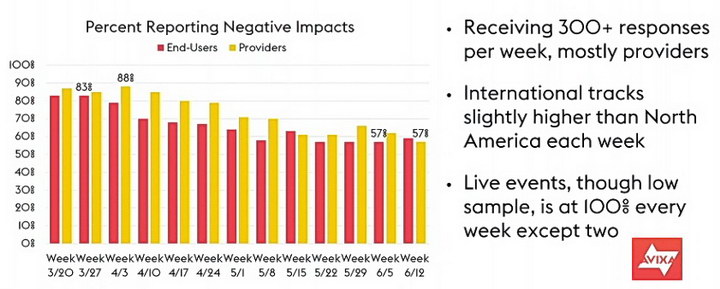 Results of a weekly Avixa member survey, March through June, 2020 (Credit Avixa)
Results of a weekly Avixa member survey, March through June, 2020 (Credit Avixa)
In his talk, Wargo describes a weekly survey Avixa does of its members, mostly providers rather than the more familiar, to DD readers at least, hardware suppliers. This survey reports that, of live event providers, virtually 100% of them are reporting “Negative Impacts” from the coronavirus pandemic. Certainly, there is no surprise there. The figure above tracks both end-users of Pro-AV and providers of Pro-AV and a majority are reporting negative impacts from the pandemic. This self-reporting of negative impacts peaks in the first few weeks of the pandemic in late March and a modest decline since then. Even so, in the week of June 12th, the most recent available, 57% are still showing negative impacts. Wargo did not try to quantify how serious these negative impacts were. Still, if 57% are showing negative affects, that means 43% of the respondents are showing either no effect from the pandemic or positive effects.
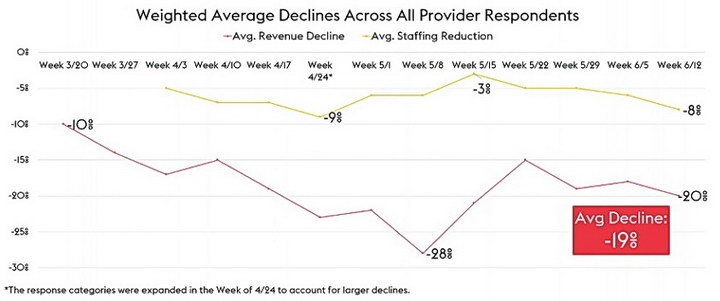 Staff and Revenue declines at Avixa survey respondents. (Cridit: Avixa)
Staff and Revenue declines at Avixa survey respondents. (Cridit: Avixa)
The survey also shows that the Pro-AV providers are trying to hold on to their staff in the face of revenue decline. The worst week for staff decline (i.e. layoffs) was April 24th, with a 9% decline. That same week, the industry saw about a 23% revenue decline. The most recent data shows an overall 8% decline in staff compared to a 20% decline in revenue. In December of 2018, I posted an article titled “Looking for a Job? Think Pro-AV.” Maybe that wasn’t such a bad bit of advice, in the face of the coronavirus pandemic. The 8% decline in employment in the Pro-AV industry is less than the overall loss of jobs in the US, which is closer to 14%.
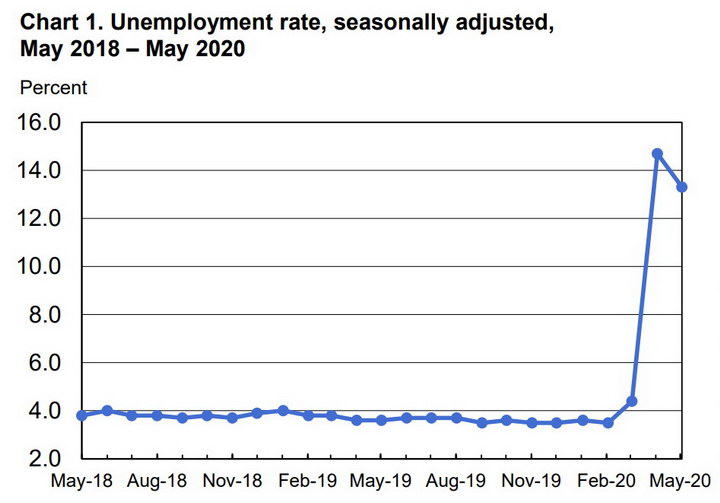 US Unemployment rate, May 2019 through May 2020. (Credit: US Bureau of Labor Statistics)
US Unemployment rate, May 2019 through May 2020. (Credit: US Bureau of Labor Statistics)
Harry Patz, Senior Vice-President and General Manager of the Display Division at Samsung (a sponsor of InfoComm Connected 2020), joined Sean Wargo in the Keynote to give Samsung’s view of the long-term effect of the pandemic on Pro-AV. Much of what he said was also contained in a press release associated with InfoComm Connected and is what you might expect, the decline and recovery of the hospitality industry, increased use of digital signage, increased use of on-line learning by education providers, kiosks to check people for temperature before they enter a business, etc. One other thing he discussed was the Home Office.
The home office is not normally considered a part of the Pro-AV industry, since it generally consists of a laptop computer, an Internet connection and a smartphone and pre-Covid, may have been at the local coffee shop, not the home. This, however, he thinks might change. As employees do more of their work from home, a trend likely to continue after the end of the pandemic, their home offices are likely to become more complex. In tomorrow’s DD, I will examine perhaps the most complex “Home Offices” of all – home systems designed to produce live TV programs for major TV networks and stations.
The live portions of InfoComm Connected 2020 were held June 16 – 18, but they were all recorded. It is not to late to register and see the Keynote speeches and other material associated with InfoComm Connected 2020.
By the way, as I was writing this, an e-mail from SMPTE announced the SMPTE 2020 annual conference, originally scheduled to be held November 10 – 12 in Hollywood, has been converted to a virtual event. I know an event like InfoComm, NAB, SID and now SMPTE take months and years of advance planning, so I’m not surprised. I wonder when Covid-19 will lose its grip on the live events industry? According to Samantha Phenix, talking at the Avixa Board of Directors Fireside Chat that was Thursday’s Keynote, not till 2021 at the earliest. – Matthew Brennesholtz

